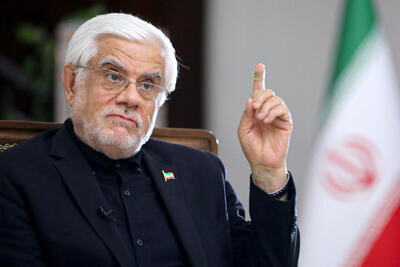VP says Leader, public unity key to Iran’s resilience in 12-day war

TEHRAN – Iran’s First Vice President Mohammad Reza Aref says the government’s rapid response, strategic planning, and the leadership of the Leader of the Islamic Revolution Ayatollah Seyyed Ali Khamenei enabled the country to effectively manage the 12-day conflict with Israel.
In an interview with KHAMENEI.IR, Aref detailed the government’s handling of the war, outlined contingency planning, and warned of potential post-ceasefire threats, stating that Iran remains on high alert despite the temporary pause in hostilities.
Aref said the administration had been operating under “wartime assumptions” well before the conflict erupted, citing the assassination of a foreign guest in Iran as the trigger. “By October, we had shifted internally to a wartime framework while projecting calm to the public,” he said.
Two economic scenarios were drafted: one based on daily oil exports of 500,000 barrels and one assuming zero exports.
Following the first Israeli strike, the government convened an emergency session, delegating full authority to provincial governors under Article 127 of the Constitution and activating four crisis task forces on economy, infrastructure, security, and public messaging. Each was granted executive power to manage its respective domain.
Despite Israeli bombardments, Aref said the country avoided supply shocks and panic buying. “We did not tap into strategic reserves. The system held,” he said.
Gasoline consumption briefly surged to nearly 200 million liters—up from the daily average of 120 million—but was quickly stabilized. Aref credited calm public behavior, swift logistical response, and the commitment of truck drivers and wholesalers. “In some cases, goods were sold below cost in solidarity with the people,” he noted.
According to Aref, Israel’s military campaign failed to achieve its goals: crippling Iran’s defense command, triggering domestic unrest, and forcing Iran to the negotiating table.
“None of these materialized,” Aref said. “The Iranian people stood firm. The Leader’s messages shaped public confidence and solidarity. What Israel encountered was a unified, resilient nation.”
Aref cautioned that the pause in hostilities should not be mistaken for lasting peace. “Figures like Netanyahu and Trump are not reliable. Lebanon’s experience taught us that the largest number of martyrs can come after a ceasefire,” he said.
All ministries have been instructed to submit detailed wartime reports to assess gaps and reinforce national readiness. “If conflict resumes, our response will be faster and more forceful,” he said.
In response to U.S. President Donald Trump’s call for unconditional negotiations, Aref said Iran rejects any notion of surrender.
“The word ‘surrender’ has no place in Iran’s political or defense doctrine. We are not aggressors—but we will finish any war forced upon us.”
He added that Iran’s foreign policy is based on dignity, wisdom, and national interest, and that the country will not compromise its principles under pressure.
Aref praised Ayatollah Khamenei’s decisive wartime leadership, especially his swift appointment of new commanders following battlefield martyrdoms. He also highlighted the Leader’s unexpected appearance at the Imam Khomeini Hosseiniyeh on Ashura night as a turning point.
“His presence changed the national mood and sent a message of defiance and calm. It was a moment that reminded the world—and ourselves—that Iran’s strength lies in faith, unity, and leadership.”
